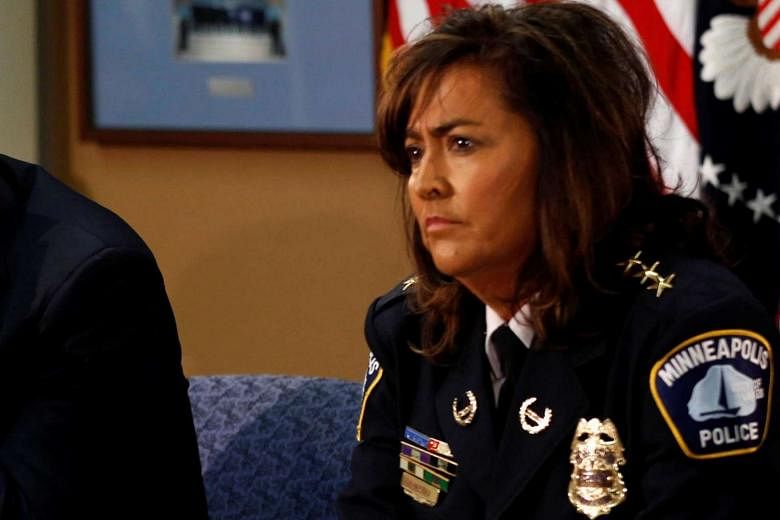NEW YORK (NEW YORK TIMES) - The Minneapolis police chief, Janee Harteau, resigned on Friday (July 21) at the mayor's request, less than a week after one of the city's officers fatally shot an unarmed Australian woman who had called 911 for help.
Mayor Betsy Hodges said in a statement that "I've lost confidence in the chief's ability to lead us further" and that "it is clear that she has lost the confidence of the people of Minneapolis as well."
The fatal shooting of the Australian, Justine Damond, last weekend by Officer Mohamed Noor led to outpourings of grief in Minnesota and outrage in Damond's home country, where the prime minister has condemned the shooting and Damond's family members have expressed frustration with how little they have been told about what happened.
Last Saturday (July 15), Damond, 40, called 911 twice to report a possible sexual assault near her home. Noor and his partner, Officer Matthew Harrity, arrived at the scene in a dark alley several minutes later. Harrity told state investigators that he had been startled by a loud noise just before Damond approached their cruiser. Noor then shot her through the open window.
Noor has declined to speak with investigators, and the authorities have provided no explanation for why he shot Damond. Neither Noor nor his partner had turned on their body cameras.
Harteau, a 30-year veteran of the Minneapolis police force, said in a statement that "the recent incidents do not reflect the training and procedures we've developed as a department".
"I've decided I am willing to step aside to let a fresh set of leadership eyes see what more can be done for the MPD to be the very best it can be," Harteau said. "The city of Minneapolis deserves the very best."
Damond's death was the latest high-profile episode to raise questions about police tactics under Harteau's watch. In 2015, weeks of protests followed the fatal shooting of Jamar Clark, an unarmed black man.
Nekima Levy-Pounds, a civil rights lawyer and activist running for mayor of Minneapolis, said Harteau "needed to be fired". Levy-Pounds said it had been "a slap in the face to people of colour" that the chief spoke out about the death of Damond, who was white, after defending officers involved in past shootings of black people.
"She is attempting to paint this as an isolated case based on one officer's poor judgment as opposed to a systemic pattern," Levy-Pounds said.
Hodges, who is up for re-election in November and who has faced criticism for her own handling of police issues, said she was appreciative of Harteau's service but had requested her resignation.
"In conversation with the chief today, she and I agreed that she would step aside to make way for new leadership," Hodges said. "I asked Chief Harteau for her resignation, she tendered it, and I have accepted it."
Hodges said she would nominate Medaria Arradondo, currently the assistant chief in Minneapolis, to become chief of police.
At a news conference at City Hall on Friday night about the chief's departure, protesters interrupted Hodges and called on her to resign, as well. "Bye, bye, Betsy," they chanted when she tried to continue speaking.
Harteau was the first woman to serve as Minneapolis police chief, and is also openly gay. She worked her way through the ranks of the department after joining in 1987, and was seen by some nationally as a police reformer who outfitted officers with body cameras and advocated restorative justice.
But locally, her department faced frequent protests and criticisms for its use of force and treatment of black people.
Harteau was also believed to have a strained relationship with Hodges. The two leaders faced criticism from the Justice Department for their coordination during 2015 protests. And earlier this year, Hodges publicly overruled the chief on a promotion decision.
State investigators continue to probe Damond's death. Both Hodges and Harteau have said she should not have been shot.
"Justine didn't have to die," Harteau said on Thursday, citing information released by state officials investigating the case. "I believe the actions in question go against who we are as a department, how we train and the expectations we have for our officers."

